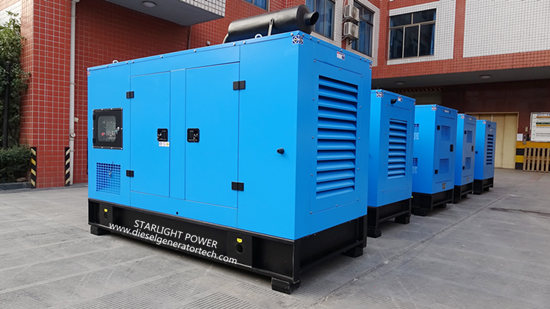Diesel generator set is widely used in industrial and agricultural production, national defense, science and technology and daily life. But many customers in the purchase of diesel generator set, in order to save cost, always want to buy the maximum power 300kw diesel generator with low cost. In the long-term operation process of diesel generator set, parts will produce certain loss. If it is light, it will affect the safe operation of the unit. If it is serious, it will lead to the normal operation of the unit.
So what kind of loss will 300kw diesel generator set produce in the process of operation?
1.When assembling diesel generator set, will install fan water radiator to connect alternator bearing. At this time, the power of the generator set will lose 10% compared with the diesel engine.
2.DC loss. It is the loss of generator stator current through stator winding.
3. Core loss, It is the magnetic loss produced by the generator flux in the generator. It includes three aspects: magnetic loss, eddy current loss and additional loss produced by the main flux in the stator core.
3.Excitation loss. It is the loss of excitation current in the rotor circuit when the generator is running.
4.Additional loss of electrical equipment, loss of leakage flux near the end of generator, loss of harmonic flux, iron loss of sub harmonic and high harmonic on the surface of rotor, etc.
5.Mechanical loss. It refers to the ventilation loss and friction loss of transmission parts during the operation of the generator set.

In order to prevent the wear of generator equipment and ensure the safe operation of the equipment, please focus on the regular maintenance of these parts, so as to improve the maintenance quality and extend the service life of the generator set.
According to your question, how to optimize the operation of diesel oil generator and reduce energy consumption? There are several ways to reduce energy consumption:
1.Pay attention to that some minerals or impurities, which will precipitate at the bottom of the purified diesel oil tank after it has been used for a period of time, which should be removed or purified regularly. Otherwise, it will have a great impact on the normal operation of the plunger and the fuel injection head, which is easy to cause inaccurate fuel supply time, uneven fuel supply, poor fuel atomization, etc., resulting in increased fuel consumption and decreased power.
2.During the operation of diesel engine, due to the high temperature of relevant components in the combustion process, the ash carbon polymer will adhere to the valve, valve seat, fuel injection nozzle, piston top, etc. if it is not cleaned in time, the fuel consumption will increase and the normal operation of the engine will be seriously affected. Generally, it is best to clean it once every 4-6 months.
3.Don't overload operation. The overload operation of small horse pulling cart type will turn a considerable part of diesel into black smoke, which will not give full play to its effective function, increase fuel consumption and shorten the service life of relevant parts.
Above information is about losses of in operation of diesel generator, hope it is helpful to you. If you are still not clear on this, do not hesitate to contact us. Besides, we also sell and produce diesel generator set with Cummins, Volvo, Perkins, Deutz, Yuchai, Shangchai generator, Weichai genset, Ricardo, MTU, Wuxi etc. Please send inquiry to us if you have plan to purchase, we will provide you the best product and service. Contact us: sales@dieselgeneratortech.com.
Comments
Post a Comment